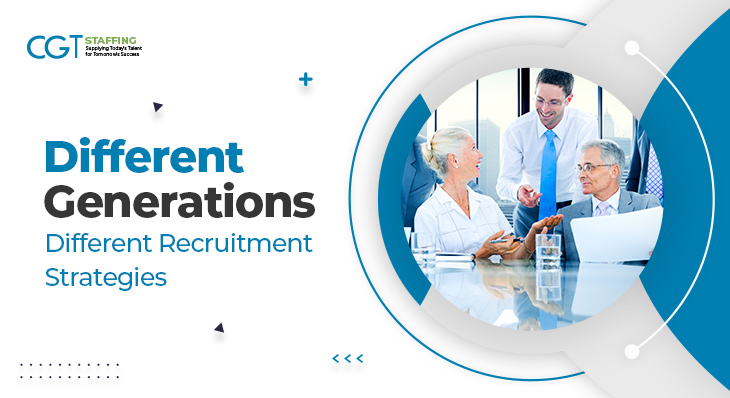In today’s diverse workforce, employers must navigate the unique characteristics and preferences of different generations. From Baby Boomers to Gen Z, each group brings its own set of values, experiences, and expectations to the table. Whether the organization uses direct hire recruiting or outsources its recruiting initiatives, it is still vital for the management to understand how to accommodate to different generations within their workforce. Adapting your recruitment strategies to appeal to these distinct generational cohorts is crucial for attracting and retaining top talent.
Table of Contents
Understanding the Generations
To effectively recruit across generations, we must first gain a deeper understanding of each age group’s traits and preferences. This understanding lays the foundation for tailored recruitment strategies.
Baby Boomers: Embracing Experience
Baby Boomers, born between 1946 and 1964, are known for their strong work ethic and dedication. They value stability and job security. When recruiting Baby Boomers, highlight your company’s history, long-term prospects, and mentorship opportunities. Emphasize their potential to make a meaningful impact based on their extensive experience.
Generation X: Seeking Work-Life Balance
Gen Xers, born between 1965 and 1980, prioritize work-life balance. They appreciate flexibility and value their independence. Show them how your company supports work-life balance through remote work options and family-friendly policies. Highlight opportunities for career growth and how they can maintain their autonomy within the organization.
Millennials: The Tech-Savvy and Purpose-Driven Generation
Millennials, born between 1981 and 1996, are digital natives and driven by purpose. They seek employers who align with their values and offer opportunities for skill development. In your recruitment efforts, showcase your commitment to social responsibility, training programs, and a tech-savvy work environment.
Generation Z: The Up-and-Coming Innovators
Born from the mid-1990s to the early 2010s, Gen Z is the newest entrant to the workforce. They are highly tech-dependent, seeking innovation and inclusivity. To attract Gen Z talent, focus on your company’s commitment to cutting-edge technology, diversity and inclusion initiatives, and fast-paced career advancement.
Tailoring Your Job Postings
Write Clear and Concise Job Descriptions
For Baby Boomers and Gen Xers, ensure your job postings are detailed and emphasize job security. Use language that highlights stability, such as “long-term opportunities” and “established company.”
Embrace Technology and Innovation
For Gen Z recruitment, focus on your company’s use of cutting-edge technology and opportunities for innovation. This becomes more imperative for recruiters in dynamic business landscapes such as telecom staffing agencies. Use tech-related terms like “digital innovation” and “modern workplace.”
Highlight Work-Life Balance
When targeting Gen X, stress flexible work arrangements, family-friendly policies, and the ability to maintain a work-life balance. Use phrases like “flexible schedules” and “remote work options.”
Showcase Purpose and Values
In job postings aimed at Millennials, emphasize your company’s commitment to social responsibility and its mission to make a positive impact. Include phrases like “socially conscious organization” and “career development opportunities.”
Using the Right Communication Channels
Traditional Media for Baby Boomers
Leverage print advertisements, industry magazines, and community networking events to reach Baby Boomers. Personalize your interactions and show appreciation for their wealth of experience.
Digital and Social Media for Gen X
Gen Xers are tech-savvy, so utilize online platforms, social media, and email campaigns to engage them. Keep your communication clear and concise and focus on the ways in which your company supports a work-life balance.
Online Platforms and Company Websites for Millennials
To connect with Millennials, leverage online job boards, company websites, and social media platforms. Highlight your company’s mission and values through engaging content.
Cutting-Edge Platforms for Gen Z
Gen Z prefers innovative channels. Try video interviews, virtual reality job fairs, and AI-driven recruitment tools. Showcase your company’s tech prowess and commitment to diversity and inclusion.
Diversity and Inclusion Initiatives
To cater to the expectations of all generations, make diversity and inclusion a central part of your recruitment strategy. The organization must necessarily clarify its expectations of its employees: What constitutes a productive employee? What is insubordination? How can employees express concerns? How the organization can address those concerns? Show that your company fosters a culture of acceptance and equity. Ensure that your hiring process promotes equal opportunities for all.
The Power of Storytelling
In all your recruitment efforts, storytelling is a powerful tool. Share success stories and employee testimonials that resonate with the values and aspirations of each generation. By personalizing your recruitment message, you can connect on a deeper level.
Tailoring the Interview Process
Structured Interviews for Baby Boomers
Conduct structured interviews that focus on their experience and their ability to adapt to the company’s long-term vision. Engage in meaningful conversations that draw from their extensive background.
Flexible Interviews for Gen X
Offer flexibility in the interview process for Gen X candidates. Allow them to choose between virtual or in-person interviews to accommodate their work-life balance.
Behavioral Interviews for Millennials
For Millennials, utilize behavioral interviews that evaluate their alignment with the company’s values. Assess their ability to adapt, learn, and grow within the organization.
Interactive Interviews for Gen Z
Gen Z candidates are drawn to interactive interviews. Incorporate tasks, simulations, and collaborative activities to assess their problem-solving and innovation capabilities.
Conclusion
In today’s multigenerational workforce, personalization is the key to effective recruitment strategies. Understanding the diverse needs and preferences of each generation, tailoring the talent acquisition strategy, and promoting diversity and inclusion initiatives can help your company attract top talent from every age group. By doing so, you’ll create a workplace where different generations coexist harmoniously, propelling your organization’s success into the future.
